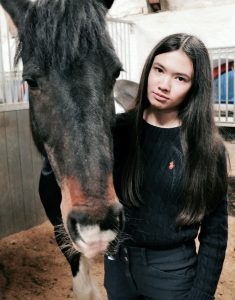 Today is International Women’s Day, a chance to celebrate women’s achievement, raise awareness of discrimination and #EmbraceEquity. Here’s what final-year BSc Economics students Alicja and Madeline have to say on inspiration, leadership and their hopes for the future.
Today is International Women’s Day, a chance to celebrate women’s achievement, raise awareness of discrimination and #EmbraceEquity. Here’s what final-year BSc Economics students Alicja and Madeline have to say on inspiration, leadership and their hopes for the future.
By Ffion Lindsay
What do you personally find exciting about economics?
Alicja: Economics teaches you about things like strategies, incentives, utility and welfare. If you really think about it, these are all aspects of our everyday lives. Economics allows you to model many situations in a systematic way, and I think it’s cool.
Madeline: I always enjoyed both mathematics and analytical writing at school, and economics offered a great blend of these two things for me. One of the most exciting things about studying economics is the opportunity you have to tangibly impact policy. The subject is constantly evolving and adapting to meet the present challenges faced by people around the world – including climate change and growing inequality.
Who are the women who have inspired you to study and pursue a career in economics?

Alicja: MIT Professor Esther Duflo for sure – I’m absolutely obsessed! I remember watching her Nobel Lecture in 2019 when she said how important it is to test hypotheses, even those that we believe we already know and that seem so obvious, once tested rigorously can actually tell us something different. It may actually show that we reject a generally accepted idea in favour of an alternative, and these results can be very informative. There have been countless moments when I’ve thought back on this idea during my studies.
Madeline: Growing up, I tried to play my part in minimising my negative impact on the environment, but I felt that I alone could not make much of a change. I always wanted to get involved in much larger-scale initiatives. Inspirational people like Greta Thunberg show me how much potential there is for each and every person to try to bring about the change they want to see. These figures have positively influenced my desire to work in public policy in the future.
Tell us about a time you stepped up into a leadership role?
Alicja: In 2022, I was pleased to make economics an official subject in the Student Research Journal along with two other undergraduate students who were all interested in promoting student research. As the Subject Editor, I led the Economics Editorial Board and have enjoyed seeing many papers from ECON20021 History of Economic Thought. The papers really demonstrate an intellectual dimension of economics as a philosophy I believe few people get to see, and this has made my role feel particularly meaningful. The journal not only offers students extra recognition for their hard work, but also showcases what each subject has to offer in a very authentic way. Having had my professors’ support of this initiative is something I have been truly grateful for!
Madeline: I’m happy to talk to people in small groups but I used to get very nervous when talking to large crowds. I knew this was something I wanted to address before I finished my undergraduate degree, so I joined the Women in Law Society in first year and took part in the Women in Debating Competition. I’m proud of myself for using it as an opportunity to grow out of my fear rather than overthinking the situation.
What challenges do you feel women face in academia, economics especially?

Madeline: It should not be seen as enough to simply fill 50% of academic posts with women. In these posts, women need to be heard and valued to the same extent as their male counterparts – with the same promotion opportunities, the same work levels and the same publication demands, which research shows is currently not the case.
I hope the effort to make academia more inclusive is moved up on the agenda, not just for women but for all marginalised groups.
What advice would you give a female economics student just starting out?
Alicja: Sometimes I get the impression that the gender imbalance issue in economics is a message targeted at girls – this makes it feel like this is only a girls’ issue and internalising this can be unhealthy. Surround yourself with professors who recognize your strengths, who are curious about you and who look after you a little extra. My general advice to any student would therefore be to book the very last office hour slot given that day.
Madeline: If you can, ask your lecturers and peers questions, either to clarify your understanding of difficult concepts or to learn about something new that you are interested in. This can be daunting as a woman if you feel part of the minority, but it helps me to remember that everyone on the course has as much right to be there as anyone else.
What are your hopes for the future?
Alicja: I hope more students seek academic extra-curricular activities to challenge themselves intellectually beyond the core curriculum and that more engage with the research journal, either as a student writer or as a member of the Editorial Board. Since it is still quite new, I would really love to see the journal become a common thing that everyone on campus knows about.
Madeline: I am planning to pursue a Master’s degree in economics. My goal is to become a professional economist engaged in the design and evaluation of public policy. In the long term, I hope to work at an intergovernmental organisation, like the UN, where I could help find creative solutions to global policy challenges. I am especially interested in sustainable development and environmental policy, and have seen the positive influence economists can have in these fields.
Many thanks to Alicja and Madeline for sharing their experiences. You can share your thoughts on Twitter, Facebook and Instagram.

